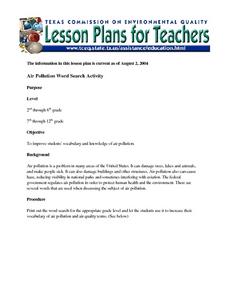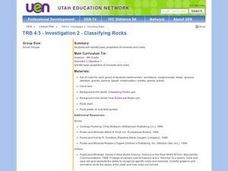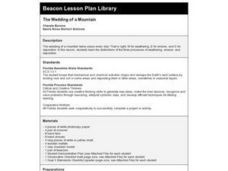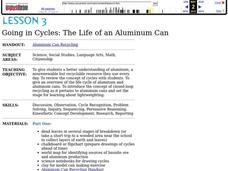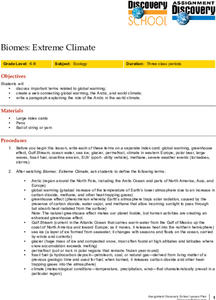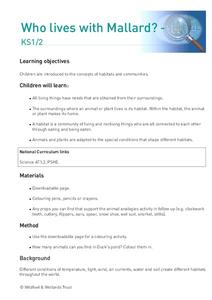Curated OER
Gravity
In this gravity worksheet, 8th graders complete 4 different questions related to defining gravity. First, they identify the various types of mass movement that is described in each. Then, students explain what each of the 4 types of...
Curated OER
Relative Dating in Archaeology
Students create a timeline that explains how ancient cultures used artifacts. In this Relative Dating in Archaeology lesson, students examine artifacts and draw conclusions about their origins. Then students analyze antiquated objects or...
Curated OER
Pollution - What is It Doing to Us?
Students recognize some forms of pollution. For this science lesson plan, students recognize and understand some of the devastating effects of the acid rains and other possible factors that are contrary to the pH balance of nature.
Curated OER
Reading - Archeologist
In this online interactive archeologists worksheet, students respond to 8 fill in the blank and multiple choice questions regarding the information included in the provided paragraphs.
Curated OER
Photosynthesis
In this online interactive photosynthesis worksheet, students respond to 9 multiple choice and fill in the blank questions regarding the information included in the provided paragraphs.
Curated OER
Human Impact on the Environment
In this environmental science worksheet, students complete a crossword puzzle with 26 questions about human impact on the environment.
Curated OER
The Three Worm Phyla
Ninth graders examine the three worm phyla. In this classification lesson, 9th graders observe, compare and contrast the planarian, tapeworm, and fluke.
Curated OER
Sediment Deposition Lab
Students set up a stream table, observe erosion, and record data on where various sizes of sediments settle. They draw conclusions as to what kind of sedimentary rock form in what locations.
Curated OER
The Environment
Students participate in three stations in which they are made aware of the environment, ways to preserve it, the importance of preserving it and their part in preserving it. They discuss where items are found, recycling, and...
Curated OER
Air Pollution Word Search Activity
Students examine the issues surrounding air pollution. They discover how it affects peoples health and the government's regulations. They complete a word search activity to practice the vocabulary.
Curated OER
Rate of Decomposition
Students experiment with the decomposition rate of garbage. They discover that environments are fragile and need to be protected and resources are not always used wisely. They then think about their own environment and then about the...
Curated OER
Pop Bottle Terrarium
Young scholars make terrariums out of bottles, pebbles, cuttings from other plants, and water. In this terrarium lesson plan, students learn about recycling by using household items to make terrariums.
Curated OER
Exploring Rocks
Students recognize differences in the size, shape, texture, and color of different rocks. For this rocks lesson plan, students also learn and repeat back how a volcano erupts and make one out of a toilet paper tube.
Curated OER
WONDERFUL, WATERFUL WETLANDS
Students list characteristics of wetland and describe the functions of a wetland.
Curated OER
Investigation 2 - Classifying Rocks
Fourth graders identify basic properties of minerals and rocks. They access websites and utilize worksheets imbedded in this lesson to further their understanding of rock classification.
Curated OER
The Wedding of a Mountain
Pupils examine the differences between weathering, erosion, and deposition as it pertains to mountains.
Curated OER
Going in Cycles: The Life of an Aluminum Can
Students investigate the manufacture of aluminum cans and consider the energy and resources saved when the cans are made from recycled material. They explore the concept of closed-loop recycling using charts, worksheets and discussion.
Curated OER
What Do Trees Do for Dinner?
Students investigate how trees produce their own food. They examine chlorophyll cells with a microscope, analyze a cross section of a log, determine how old the tree was, simulate the distance of the roots, and create a play.
Curated OER
Building With Bricks
Learners examine the reasons why people built homes and businesses with brick. They discover how brick technology has improved buildings over the years. They participate in an activity to complete the lesson.
Curated OER
The Rock Cycle
Third graders study the 3 main types of rocks: igneous, sedimentary, metamorphic. They examine samples of these types of rocks and discuss ways to tell what kind of rock each is. They take notes and draw pictures in their science...
Curated OER
Biomes: Extreme Climate
Students create a web connecting global warming, the Arctic, and wold climate. They write a paragraph explaining the role of the Arctic in world climate.
Curated OER
It's a Small World After All! (Pond Microcosms)
Learners use microscopes to investigate the diversity of life that exists in pond water. They then conduct a controlled investigation to study the effect of a pollutant (rice) on a microcosm ecosystem.
Curated OER
Who lives with Mallard?
Students explore how all living things have needs that are obtained from their surroundings. They identify the surroundings where an animal or plant lives is its habitat. Students identify that a habitat is a community of living and...
Curated OER
Segmented Worms
In this segmented worms worksheet, high schoolers will review the characteristics of segmented worms including the earthworm, bristleworm, and leech. This worksheet has 7 fill in the blank, 3 true or false, and 3 matching questions.
Other popular searches
- Soil Layers Diagram
- Layers of Soil
- Layers of Top Soil
- Soil Layers Activity
- Elementary Soil Layers
- Three Layers of Soil
- Earth Soil Layers
- Soil Layers Grade 7
- Layers of Soil Quiz
- Four Layers of Soil
- Jello Soil Layers
- Soil Layers Demo









